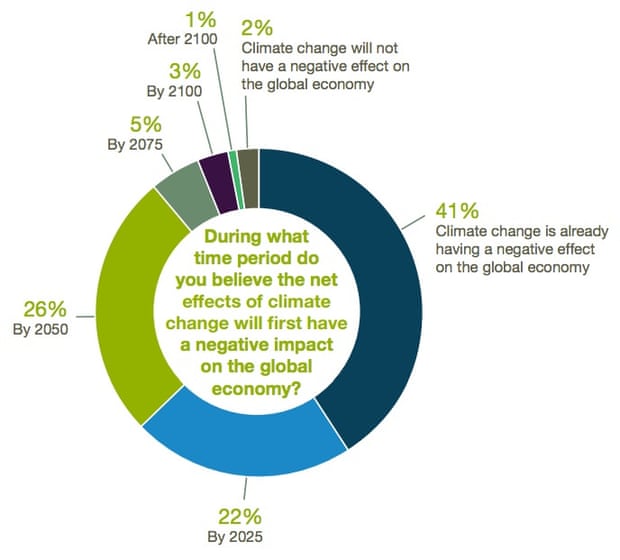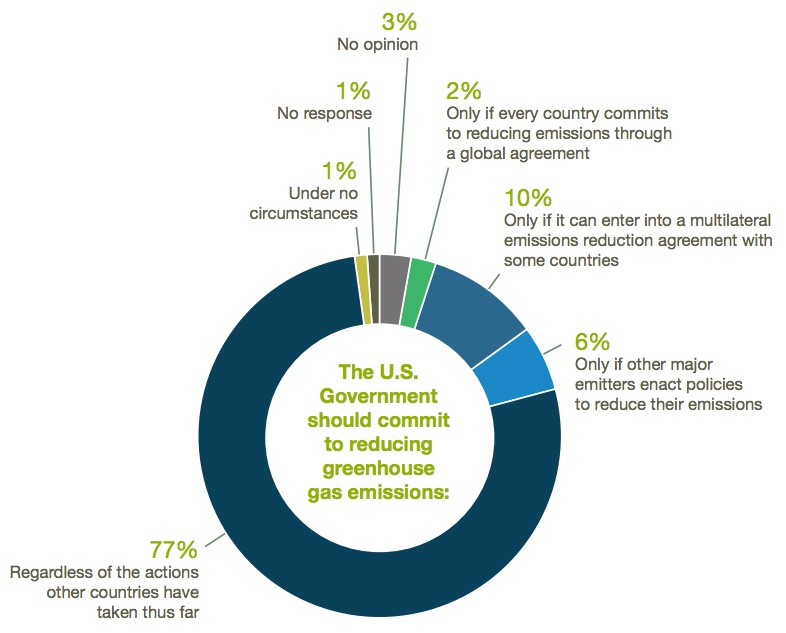95% consensus of expert economists: cut carbon pollution
Posted on 4 January 2016 by dana1981
The Institute for Policy Integrity at the New York University (NYU) School of Law recently published a report summarizing a survey of economists with climate expertise. The report was a follow-up and expansion of a similar survey conducted in 2009 by the same institute. The key finding: there’s a strong consensus among climate economics experts that we should put a price on carbon pollution to curb the expensive costs of climate change.
The survey participants included economists who have published papers related to climate change “in a highly ranked, peer-reviewed economics or environmental economics journal since 1994.” Overall, 365 participants completed the survey, which established the consensus of expert climate economists on a number of important questions.
Carbon pollution cuts are needed regardless of what other countries do
In the 2009 version of the survey, the respondents were asked under what conditions the United States should commit to reducing greenhouse gas emissions. 57% answered that the US should cut its emissions no matter what actions other countries take, while another 38% said that American emissions cuts would be warranted if many or all other countries commit to reducing theirs (as just happened in the Paris international negotiations).
In the 2015 survey, the number of expert economists saying that the US should cut its emissions no matter what rose to 77%. A further 18% said that if other countries agree to cut their emissions, the US should follow suit. In other words, there is a 95% consensus among expert climate economists that the US should follow through with its pledges to cut carbon pollution in the wake of the Paris international climate negotiations, and more than three out of four agreed that the US should take action to curb global warming no matter what.
2015 New York University survey results of economists with climate expertise when asked under what circumstances the USA should reduce its emissions
This expert consensus is in stark contrast to conservative political opposition to the Paris accord. For example, Republican presidential candidate Marco Rubio said of the agreement,
This kind of unilateral disarmament in our economy is reckless, and it is hurting the American Dream
Quite obviously an international agreement made by 195 nations around the world is the antithesis of unilateral action. However, 77% of expert economists agree that unilateral action would be appropriate in any case, directly contradicting Rubio’s comments. Additionally, 82% of the experts agreed that by implementing climate policies, the US could strategically induce other countries to cut their carbon pollution.
Climate change is already hurting the global economy
When asked at what date climate change will have a net negative impact on the global economy, the median survey response was 2025. In the recent past, climate change likely had a net positive impact on the global economy, due primarily to the effect of carbon fertilization on crops and other plant life. However, even contrarian economists agree, when accounting for the vulnerability of poorer countries to climate impacts, global warming has been hurting the global economy since about 1980.
The NYU survey asked when the economic benefits we experienced up to 1980 would be completely wiped out; 41% of respondents said that’s already happened. Another 25% answered that it would happen within a decade, and 26% said we’d see net negative economic impacts by 2050. If we continue with business-as-usual pollution and warming, on average the experts predicted a GDP loss of about 10% by the end of the century, and that there would be a 20% chance of a “catastrophic” loss of one-quarter of global GDP.

Figure 5 from ‘Expert Consensus on the Economics of Climate Change’ 2015 report by the NYU Institute for Policy Integrity.
Of course, ideally we would have stopped warming the planet in 1980 to preserve the economic benefits of global warming to that date. At this point it’s a question of just how much damage climate change will do to the global economy, and the economic experts are worried that the results could be catastrophic.
Climate change will hurt economic growth
78% of the survey participants said that it’s likely (36%) or extremely likely (42%) that climate change will have a long-term negative impact on the growth rate of the global economy. That’s an important point, because most current integrated economic-climate assessment models assume that economic growth will continue regardless of climate change impacts. There’s been a growing body of research indicating that as you might expect, that won’t be the case.
The results of this survey question show that most expert economists agree, climate change will hurt global economic growth. That also suggests that past model-based studies likely significantly underestimated the costs of climate change. Along the same lines, 51% of the experts answered that the US government’s estimate for the “social cost of carbon” ($37 per metric ton), which is largely based on estimates from these models, is too low. 18% of the experts said that value is about right, and just 8% said it’s too high.
Carbon pricing is an efficient way to cut pollution
The survey also asked the experts about the most economically efficient method of reducing carbon pollution. 81% said a market-based system (carbon tax or cap and trade system) would be most efficient, while 13% answered that coordinated performance standards and programs that prioritize cleaner fuels and energy efficiency would be most efficient.
In the US, President Obama’s Clean Power Plan is closer to the latter system of performance standards, although the president has said he would prefer the type of market-based system favored by 81% of economic experts. Implementing a carbon tax or cap and trade system would require bipartisan congressional action, but over the past several years, Republican Party leaders have shown scant interest in crafting the efficient climate policies favored by economic experts and by their own voters.
The NYU survey has been incorporated into the rebuttal to the myth 'CO2 limits will harm the economy.'































 Arguments
Arguments































The "cut carbon pollution" consensus number 95% assumes those who did not respond "no opinion" and "no response" (4%) have been lumped into the contrarian cetegory. Is it correct? Should they be simply excluded from the consensus number like those abstract that did not express opinion about AGW were excluded in Cook2013 survey of climate science literature? The true contrarian "under no circumstances" represent only 1%. So the "cut carbon pollution" consensus would be much higher: above 98%.
@Criskoz
I would argue that one could also include the "only if everyone else does" as actually a "do nothing" opinion because it sets a nearly impossibly high bar. It's what one says when you don't want to do something, but don't want to be seen as a lone naysayer. Still, anything over 90% is a pretty compelling level.
knaugle @2 - I'd argue that 195 countries signing onto COP21 is virtually 'every country' agreeing to cut emissions.
chriskoz @1 - 'no opinion' is a bit tricky. For example, in Cook13 we included papers that said the human contribution to global warming was uncertain (in the 3%). 'No opinion' is pretty analogous to that. It's only papers that didn't take a position (analogous to 'no response') that we excluded.
Eclectic I didn't make myself clear, irrespective of the GHG emissions from transport/industrial food processes, livestock are responsible for a bigger share of total global GHG emissions than is the whole of global transport. That's a very significant amount and I found it surprising that this and the emissions from agriculture in general, appeared not to have been comsidered by the ecomomists.
[DB] Please note that posting comments here at SkS is a privilege, not a right. This privilege can and will be rescinded if the posting individual continues to treat adherence to the Comments Policy as optional, rather than the mandatory condition of participating in this online forum.
Moderating this site is a tiresome chore, particularly when commentators repeatedly submit offensive, off-topic posts or intentionally misleading comments and graphics or simply make things up. We really appreciate people's cooperation in abiding by the Comments Policy, which is largely responsible for the quality of this site.
Finally, please understand that moderation policies are not open for discussion. If you find yourself incapable of abiding by these common set of rules that everyone else observes, then a change of venues is in the offing.
Please take the time to review the policy and ensure future comments are in full compliance with it. Thanks for your understanding and compliance in this matter, as no further warnings shall be given.
Sorry, Ryland, but I can't speak for what the economists were considering . . . other than that they foresaw major economic damage from our ongoing Global Warming.
If they had considered your concern about "fossil-oil" carbon pollution from food production/transport, versus CO2/methane output from livestock . . . then probably they would have expressed it in this way :-
~ Petroleum-oil liquid fuels produce a semi-permanent (and therefore cumulative) increase in carbon pollution, but livestock's CO2 output is not cumulative (because it's merely recycling organic carbon already "in the system"). Yes, more cattle [compared with 50 or 100 years ago] has caused a higher output of the GHG methane . . . but that methane is in itself rather short-lived and has nearly reached a plateau (compared with cattle numbers from 20 years ago ~ and cattle numbers are not likely to be very much higher in 20 or 40 years' time) . . . so we have reached a "steady state" with livestock methane. [The increasing arctic release of methane from arctic warming, is of course a separate issue from the livestock one.]
So there's no real comparison between steady-state livestock GHG's, and the cumulative carbon pollution from fossil fuels. I reckon it will be very much easier to phase out carbon pollution from transport & agricultural machinery over coming decades, than it would be to change human dietary desires into the (almost) purely Vegan vegetarian.
DB I have read the comments policy and cannot see where my post @4 contravenes. I didn't make anything up or post graphs or make offensive comments and thought the emissions from agriculture could have been considered by the economists. Is that off topic? I understand that moderation is not open to discussion but if a commenter does not understand why a post is considered unacceptable then it woiuld be most helpful if the reasons for this are made clear.
[DB] This claim of yours is unsupported sloganeering and off-topic on this post:
If you wish to pursue that topic, bring credible evidence for your claims and present them on this thread.
As suggested @6 I have posted to the appropriate thread giving references to support my comment @4. The post on that thread is @151